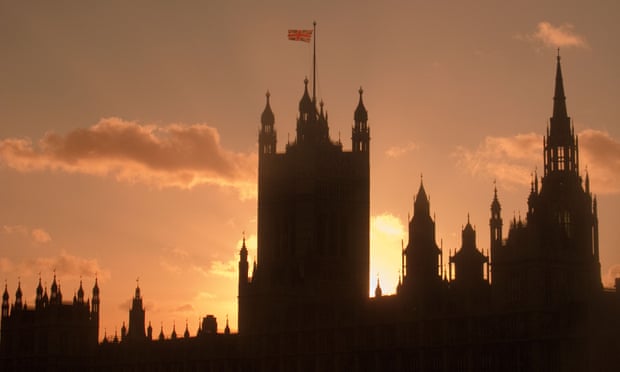A third of people in the UK believe Britain’s colonies were better off for being part of an empire, a higher proportion than in any of the other major colonial powers, a global survey has revealed.
Britons are also more likely to say they would like their country to still have an empire than people in France, Italy, Spain, the Netherlands, Belgium, Germany or Japan, the YouGov polling found.
The results were shared with the Guardian as Britain prepares to find a new place in the international order after Brexit. They have been interpreted by some as a proxy for high levels of nationalist sentiment. Conservative voters were almost twice as likely as Labour voters to yearn for Britain to still have an empire, while Brexit-supporting leave voters were more than twice as pro-empire than remainers.
The results were described as “alarming” by Oku Ekpenyon, who is leading a campaign for Britain to erect a new memorial to the transatlantic slave trade, which has so far failed to attract government backing. She said they raised questions about British education on colonial topics and highlighted the country’s tendency towards nostalgia.
Only the Netherlands appears to be more proud of its imperial history than the UK. Half of Dutch respondents said it was something to be more proud of than ashamed.
Defenders of empire saw the figures differently. Nigel Biggar, regius professor of moral and pastoral theology at Christ Church College, Oxford, said that the fact that only a minority of 32% said empire was something to be proud of meant that “if the post-colonialists really want to hound imperial flag-wavers, they should go after the Dutch”.
“Public post-colonialists like to claim that we British suffer from selective amnesia over the British Empire: we remember the good bits and forget the bad bits,” he said. “[But] are most Britons really not aware of our involvement in slavery during the 17th and 18th centuries? … When the largest segment (37%) report that they think it ‘neither something to be proud nor ashamed of’, they could mean that they’re perfectly aware of the Empire’s moral ambiguity.”
Germans, when asked about their country’s empire between 1871 and 1918 (sometimes known as the second reich), were the least likely to be proud of its colonial past (just 9%). Belgians, who have undergone a public reappraisal of their ancestors’ conduct in the country now known as the Democratic Republic of Congo under King Leopold, were most likely say its colonial territories were left worse off.
“What is in these people’s minds when they say better off?” said Ekpenyon, founder and trustee of Memorial 2007, a campaign for a slavery memorial to be built in London which is backed by prominent black Britons including Lenny Henry, Doreen Lawrence and Linford Christie. “There is nostalgia for empire. Britain still sees itself as a major force. It’s alarming that 33% think the colonised countries were better off.”
Ekpenyon said the large number of Britons with ambivalent views made her “wonder about their education” and she recalled her own schooling in the UK being taught about “David Livingstone and Mary Slessor going to Calabar and doing good for the savages on the benighted continent”.
“There are people who do not recognise the contribution that people of African heritage make to this country,” she said. “Look at the Windrush scandal.”
She highlighted a speech made by Prince Charles on a visit to Accra in Ghana in 2018 in which he apologised for the “appalling atrocity of the slave trade”. He said that while Britain led the abolition movement it has “a shared responsibility to ensure that the abject horror of slavery is never forgotten”. She suggested he needed to make this speech to a British audience to shift attitudes.
Jon Wilson, professor of modern history at King’s College London, said the likelihood that a country believes it left its former colonies better off appeared to be correlated to the extent and openness of the national debate about empire.
“[Some] have spoken about the violence of empire – Belgium in the Congo, France in Algeria, Italy in Ethiopia,” he said. “The Netherlands, like Britain, has not had that debate.”
In the UK, people aged over 64 were more than twice as likely to be proud of empire than those aged 18-24, the polling showed, which Wilson suggested may be linked to improved teaching.
“There are syllabuses that don’t shy away from the brutal truth,” he said. “But the broader public debate about empire is extremely thin and gets used as a proxy for nationalism.”
Lisa Nandy, a Labour leadership candidate, last month pledged to remove references to empire in the honours system, turning, for example, the Order of the British Empire into the Order of British Excellence.
Meanwhile the rightwing historian and Churchill biographer Andrew Roberts has argued that Brexit is a moment to reclaim the meaning of empire as a state where “no foreign power is able to alter or countermand the laws made here”. Some in the Conservative party have said Brexit is a moment for “the empire to strike back”.








































admin in: How the Muslim Brotherhood betrayed Saudi Arabia?
Great article with insight ...
https://www.viagrapascherfr.com/achat-sildenafil-pfizer-tarif/ in: Cross-region cooperation between anti-terrorism agencies needed
Hello there, just became aware of your blog through Google, and found ...